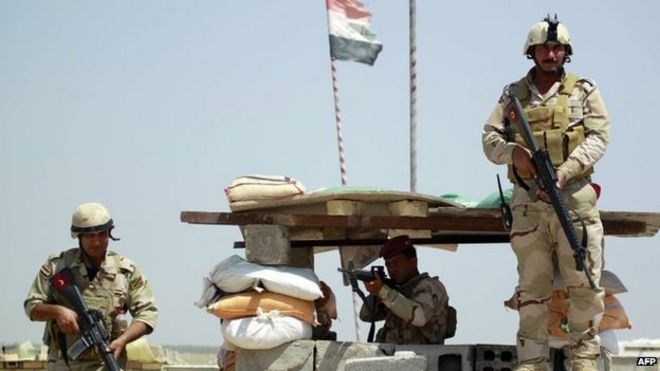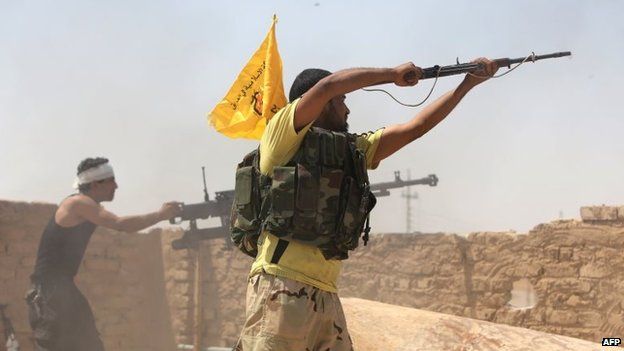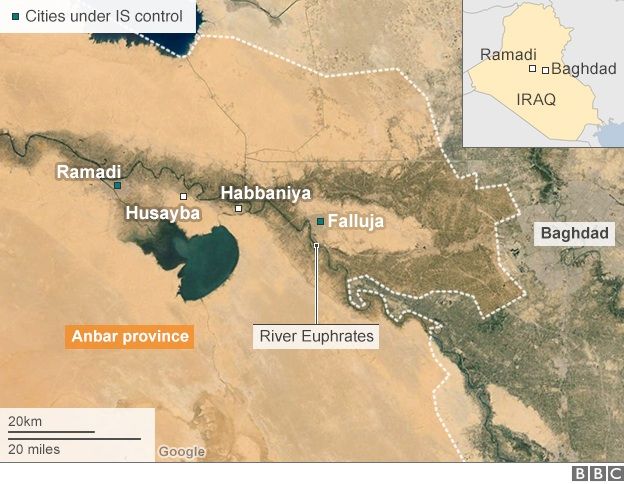Extravagant Iraqi-Iranian Hyperbole
"I am sure he [Mr Carter] was fed with the wrong information".
"They [Iraqi soldiers] have the will to fight but when they are faced with an onslaught by [IS] from nowhere... with armoured trucks packed with explosives, the effect of them [being blown up] is like a small nuclear bomb - it gives a very, very bad effect on our forces. t makes my heart bleed because we lost Ramadi, but I can assure you we can bring it back soon."
Iraqi Prime Minister Haider al-Abadi
 |
| Iraqi soldiers vastly outnumbered the IS militants in Ramadi, but still withdrew |
"There is no military solution without a political solution. In September, we linked the coalition's support to political commitments by the new Iraqi government, what we call an inclusive policy."
"This contract [that Baghdad represent the interests of all Iraqi groups] is what justified our military engagement and I say clearly here that it must be better respected."
French Foreign Minister Laurent Fabius
"[The operation to regain control of Anbar would be called] "Labayk ya Hussein" ("At your service, O Hussein") - [a revered Shia imam]."
"[The operation would] not last for a long time [new weapons would be used in the battle to] surprise the enemy."
Ahmed al-Assadi, spokesman, Popular Mobilisation (al-Hashid al-Shaabi), (comprising dozens of Shia militias)
 |
| The Iraqi government had until now resisted sending Shia militiamen to Anbar province |
In an interview with the BBC on Monday, Iraqi Prime Minister Haider al-Abadi stated with confidence that Ramadi could be recaptured "within days". As for the 1,500 Iraqi soldiers stationed in Ramadi who had fled rather than face the assault imminent by as few as 150 Islamic State jihadis, it represented a normal enough human reaction to the prospect of being blown to smithereens by dedicated suicidists, he assured any who might question the courage of Iraqi's military.
For their part, Iraqis and their Iranian supporters have been castigating the United States for not doing enough to prevent Islamic State from capturing Ramadi. The scornful remarks of Ashton Carter, the American secretary of defence that Baghdad's military had allowed itself to be routed by a far smaller force because they lack motivation, hit home, causing both Iraqi and Iranian authorities to lash out with rage.
Vice-President Joe Biden called Prime Minister Haider al-Abadi on Monday to thank him for "the enormous sacrifice and bravery of Iraqi forces", giving reassurance of American support to the Iraqi government. Now isn't that a contemptible first, assuaging the sanctimonious anger of a head of state whose own military remains uncommitted to the protection of its citizens, while giving them ample praise for surrendering U.S.-provided munitions and war machines to the enemy. As an example of 'enormous sacrifice and bravery', quite outstanding.
So Mr. Biden congratulated the Iraqi decision to mobilize additional troops to "prepare for counter-attack operations", pledging full American support to "these and other Iraqi efforts to liberate territory from ISIL". Placatorily congratulating a country that has surrendered its self-defence capabilities to a neighbour's intervention, and the assistance of another country far removed geographically but committed to aiding Iraq to rescue itself from complete annihilation as a country.
That the Iraqi military hadn't the resolve and the capacity to mount a counter-defence against an offensive by a relatively small group of terrorists speaks to the sense of personal responsibility inherent in the Iraqi psyche. Mr. Carter's remarks including that "we [the U.S.] have an issue with the will of the Iraqis to fight ISIL and defend themselves" was frank, and frankly needed. It should have had the effect of shaming Iraq into defending itself, instead the result was a counter-accusation.
As ISIL advanced, those responsible for the defence of Ramadi fled, leaving the way open for Islamic State fighters to kill hundreds of Iraqi police and to take possession of weapons and vehicles as their spoils of war, which they were. Months of U.S.-led coalition airstrikes and the deployment of technical military advisers reforming and training Iraqi security forces have led to naught in the face of ISIL's guerrilla tactics of terrorizing intimidation.
An Iraqi military commander in Anbar Province spoke of the comments by Mr. Carter as "a provocation to the Iraqi army and Iraqi people designed to make people lose their trust in the army", as though the lack of performance by the army didn't achieve that end on its very own. Do these people hear themselves? Their arrogant entitlement to blame any others who come to their defence for their own lack of commitment and performance is staggering.
About equal to the statement by the seasoned Iranian al-Quds commander General Qassem Soleimani, head of an elite unit in Iran's Revolutionary Guard who stated dismissively that the United States did not perform "a damn thing" to stop ISIL from its seizure of Ramadi. Without stating one damn thing that the Iraqi troops, let alone his own group did to apprehend the fall of Ramadi. His formidable reputation as a strategist and fighter cowering in the black shade of antagonism.
So to make the attempt to secure what has been lost, Iranian-linked Shiite militias have been called in to relieve local Sunni tribes which have suffered heavy losses of their own against Islamic State. It is estimated that around 40,000 civilians fled Ramadi. Husayba, east of Ramadi is reported to have been the venue of heavy fighting, with the claims that the Shiite militias have retaken the city.
"Today, there is nobody in confrontation with [ISIL] except the Islamic Republic of Iran, as well as nations who are next to Iran or supported by Iran", boasted General Soleimani. While a former British general mirrored Mr. Carter's comments with the comment that rebuilding Iraq's army could take a generation; sending in greater numbers of international troops to aid its fight against the jihadists would do nothing to solve its lack of "will power".

Labels: Conflict, Iran, Iraq, Islamic State, United States

<< Home